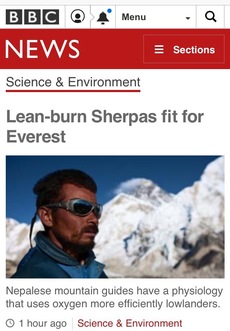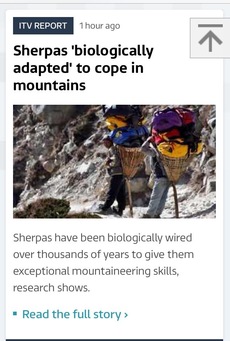Metabolic basis to Sherpa altitude adaptation
As part of our 10th Anniversary celebration, we were delighted that our Sherpa paper was released on the first day of the anniversary week. The paper entitled Metabolic basis to Sherpa altitude adaptation is the work of Xtreme Everest investigators Dr Andrew Murray, James Horscroft and Aleksandra Kotwica, and focuses on the Sherpa population of Nepal and their metabolic adaptations that have allowed their tissues to use oxygen more efficiently, thus conserving muscle energy levels at high altitude. All this could possibly contribute to why they perform so well at extreme altitudes.



The paper hit the BBC on the day of release and featured on the front page of their Science and Environment section of their website and on their BBC World Service broadcast. It then also featured on the ITV news website.
Along with the BBC and ITV featuring the paper, CNN, Masahable (a popular technology and social media magazine site), The Times, France 24 and CBC (the Canadian national broadcasting network) were some other notable press to feature us. Along with those sites, the paper was picked up worldwide in a host of foreign language press; El independiente, a Columbian national paper, Antara news, an Indonesian news network. TV NET, a Latvian news network also wrote an article about the findings in the paper.
The team were also really pleased to see some great write ups about the paper in some of the top science magazine websites; New Atlas, Seeker and science post writing great articles. Also several science bloggers such as Andy Matter picked up on the paper.
All sites will be linked below and all of the team is delighted to see such a wide exposure for the paper that was worked on so hard by the team. With special thanks going to all of our wonderful Sherpas who put their blood, muscle and sweat into helping us achieve this research.
Featured articles
BBC News
BBC World Service
ITV News
The Times
CNN
Discover magazine
Seeker
Science Daily
Andy Matter
CBC radio
Health Management
Cambridge University
Cosmos Magazine
NPR
Science Alert
To read the Sherpa paper in full, please visit the PNAS website




